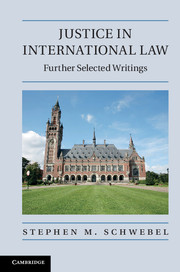Book contents
- Frontmatter
- Contents
- PART I International Court of Justice
- 1 Reflections on international adjudication
- 2 The impact of the International Court of Justice
- 3 The politics of adjudication
- 4 National judges and judges ad hoc of the International Court of Justice
- 5 The roles of the Security Council and the International Court of Justice in the application of international humanitarian law
- 6 The inter-active influence of the International Court of Justice and the International Law Commission
- 7 A site visit of the World Court
- 8 The proliferation of international tribunals: threat or promise?
- 9 The Gulf of Maine maritime boundary delimitation: the constitution of the chamber
- 10 The judgment of the International Court of Justice in the case concerning the Gabčíkovo-Nagymaros Project (Hungary/Slovakia)
- 11 Gorbachev embraces compulsory jurisdiction
- PART II International arbitration
- PART III Miscellaneous
- Collected publications, judicial opinions and book reviews
- Index
11 - Gorbachev embraces compulsory jurisdiction
from PART I - International Court of Justice
Published online by Cambridge University Press: 07 September 2011
- Frontmatter
- Contents
- PART I International Court of Justice
- 1 Reflections on international adjudication
- 2 The impact of the International Court of Justice
- 3 The politics of adjudication
- 4 National judges and judges ad hoc of the International Court of Justice
- 5 The roles of the Security Council and the International Court of Justice in the application of international humanitarian law
- 6 The inter-active influence of the International Court of Justice and the International Law Commission
- 7 A site visit of the World Court
- 8 The proliferation of international tribunals: threat or promise?
- 9 The Gulf of Maine maritime boundary delimitation: the constitution of the chamber
- 10 The judgment of the International Court of Justice in the case concerning the Gabčíkovo-Nagymaros Project (Hungary/Slovakia)
- 11 Gorbachev embraces compulsory jurisdiction
- PART II International arbitration
- PART III Miscellaneous
- Collected publications, judicial opinions and book reviews
- Index
Summary
W. Michael Reisman is unsurpassed among living international lawyers. His intelligence is acute; his legal imagination, fertile; he writes with insight, force and flair; he speaks easily, logically and convincingly; and the scale, variety, quality and profundity of the cascade of his publications is extraordinary. His concern with advancing an international law of human dignity, in the tradition of his own teachers, Myres S. McDougal and Harold D. Lasswell, is unflagging. Over the decades he has taught much of the elite of the profession, and his devotion to his students has been returned by their devotion to him. His contributions to the development of international law have not been confined to teaching and scholarship. He is an active and sought-after counselor, expert and arbitrator. Having sat with him on more than one arbitral tribunal, and having enjoyed hearing his arguments in others, the writer can attest to his quite exceptional authority. It is a privilege to join with his other friends and admirers in contributing to this volume.
My topic is a remarkable article by a remarkable man, Mikhail Sergeyevich Gorbachev, the former General Secretary of the Central Committee of the Communist Party of what was, at the time of the article's publication, the Soviet Union. The Soviet press published Gorbachev's article on September 17, 1987, and the next day it was circulated as a UN document.
- Type
- Chapter
- Information
- Justice in International LawFurther Selected Writings, pp. 124 - 134Publisher: Cambridge University PressPrint publication year: 2011



